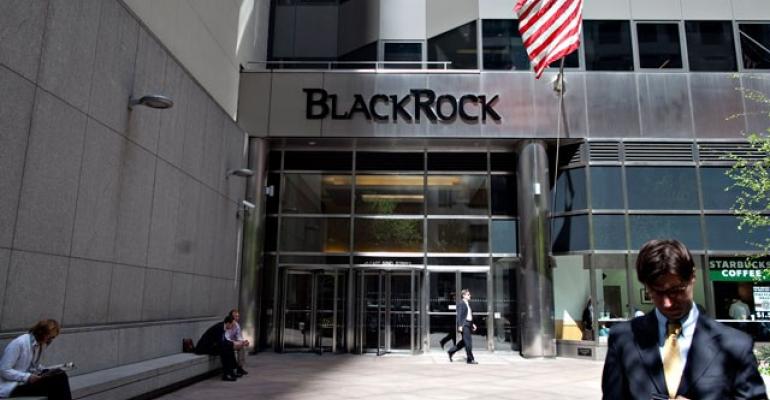By Liz Capo McCormick
(Bloomberg) --Two titans of the bond market are still clinging to the idea that inflation is going to make a comeback.
Time and again, weak economic data have made the market’s inflationistas -- many of whom were beguiled by President Donald Trump’s pro-growth promises -- look a little foolish.
But for Vanguard and BlackRock, it’s only a matter of months before inflation is back at 2 percent. Regardless of what does (or doesn’t) happen in Washington, a tight job market will boost wages, lead Americans to spend more and push up consumer prices. Add to that a weak dollar and prospects the Federal Reserve will hold off raising interest rates until 2018, and they see a good chance the bond market is too downbeat about inflation.

“The underlying trends in core inflation will be higher,” said Gemma Wright-Casparius, a senior money manager at Vanguard, which oversees $4 trillion.
Getting it right matters. Despite rock-bottom rates and trillions of dollars in quantitative easing by the Fed, inflation has been one indicator that’s stubbornly failed to return to levels consistent with a healthy U.S. economy. Inflation eased for a fourth month in June, dropping to an annual rate of 1.6 percent. The Fed’s preferred gauge was even weaker, slipping to 1.4 percent.
That’s made it more difficult for the Fed to unwind its easy-money policies, which a growing chorus of critics say have only succeeded in inflating the price of financial assets and left the central bank with little margin for error.
Fed officials, for their part, have repeatedly said the inflation slowdown is transitory, though they acknowledged in their July statement that price measures have “declined and are running below” goal.

To Wright-Casparius, the situation has left the bond market too pessimistic. As recently as June, bond traders saw inflation averaging less than 1.7 percent a year over the next decade. While last week’s strong job and wage numbers have helped to lift the market’s outlook (known as the break-even rate in bondspeak) to 1.8 percent, it’s still too low, she says.
Vanguard estimates 10-year break-even levels should be close to 2 to 2.25 percent. In July, she bought inflation-linked Treasuries, known as TIPS, which profit when inflation exceeds the market’s expectations. Wright-Casparius said she intends to add to those positions in the months ahead.
QE Rollback
The Fed’s focus on reducing its crisis-era bond investments in coming months also means it will likely keep rates steady until at least March. Wright-Casparius says that will help ensure inflation stays at or above 2 percent once it gets there.
BlackRock’s Martin Hegarty favors inflation-linked Treasuries over those in the U.K. or Europe and suggests that bond traders are making a mistake if they expect inflation in the U.S. to remain depressed.
“TIPS are incredibly cheap,” said Hegarty, head of inflation-linked bond portfolios at BlackRock, which oversees $5.7 trillion. “As the unemployment rate continues to come down, then, from a top-down perspective, the slack in the economy will decline and ultimately put upward pressure on wages and put modest upward pressure on inflation.”
There are signs that some investors are coming around to the same view. After U.S. inflation-linked bond funds suffered redemptions in May, they added $1.2 billion in June and July, according to EPFR Global. That hardly compares to the flood of cash that the funds amassed after Trump’s election, but it’s still the first month since January that inflows have risen from the prior month.
“The economy is stronger and eventually during this second half of the business cycle inflation should trend higher,” said Jeremie Banet, a fund manager at Pimco, which oversees $1.6 trillion. Unlike Vanguard and BlackRock, Pimco sees inflation remaining below 2 percent until next year. But Banet says the firm is still overweight TIPS because they are undervalued.
History Lesson
Even if the bond market consensus is wrong about inflation, James Ong, a senior macro strategist at Invesco, which oversees $858 billion, is willing to wait before going all-in. Wage growth is starting to bounce back as more companies compete to fill job openings, but that doesn’t necessarily mean price pressures will immediately increase.
“It could take a long time for those things to affect inflation,” he said.
Recent history hasn’t been kind to TIPS bulls. The trade has been a loser -- at least compared with returns on plain-vanilla Treasuries -- in three of the past four years and is underperforming once again this year.
However, strategists at Goldman Sachs say some of the forces that have weighed down inflation expectations will soon dissipate. For example, the term premium, which measures the extra compensation investors need to own long-term Treasuries, has been depressed by the Fed’s bond purchases.
Once the central bank starts unwinding its $4.5 trillion of holdings, it should increase and push up break-even rates, they said.

Another key development that could lift inflation over the longer term is the dollar, according to Vanguard’s Wright-Casparius. A weaker dollar, which has declined about 8 percent this year against major currencies, raises the price of imported products for U.S. consumers.
“Declines we’ve seen in the dollar also should feed through to more inflation pressures in about a year from now,” she said.
To contact the reporter on this story: Liz Capo McCormick in New York at [email protected] To contact the editors responsible for this story: Boris Korby at [email protected] Michael Tsang, Mark Tannenbaum




